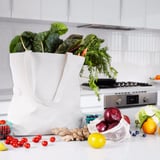mercredi 24 janvier 2018
If You're Always Bloated, Check If You're Eating Any of These Foods

If frequent bloating makes you feel like a transformer (but not in like the cool way from the movies), then it's time to take a peek at your diet. What are you eating? While there are several causes of bloating (and some have nothing to do with food!), the most common culprits are, in fact, different foods - and sometimes it feels like ALL foods.
Everyone's body is different, so don't look at this list and think, "All of these things make me bloat?!" and then systematically eradicate them from your diet. They each have the potential to cause bloating for different reasons, and depending on how your body processes and digests food, you may have issues with one, some, or none of these. The point here is to help you (if you have chronic bloating, that is) identify parts of your diet that could be causing discomfort and pain. Let's take a look.
- Dairy: While not everyone is allergic to dairy, the people who are even slightly sensitive to lactose or casein will bloat easily from consuming a dairy product. Consider eliminating dairy for a couple weeks to take note of how your body adjusts.
- Gluten: Just like with dairy, not everyone is allergic to gluten. But if you are gluten-sensitive or you have celiac disease, the inflammation caused by eating pasta, doughnuts, and cereal can do more damage than just bloating. But bloating is a good indicator that something is amiss - and you should certainly talk to your doctor.
- Soy: Soy products can ferment in your gut, which can in turn release gases and cause bloating. If you find yourself bloating often after a tofu stir-fry or a soy milk smoothie, try cutting these foods out temporarily to see if you notice a difference.
- High FODMAP foods: If your first reaction to reading that was "WTF is a FODMAP?" you're not alone. The concept of FODMAPs, which stands for Fermentable Oligosaccharides, Disaccharides, Monosaccharides, and Polyols, is a little difficult to grasp, and there aren't tons of resources out there to help navigate the confusing world of what does and doesn't cause bloating. Seemingly innocent foods like apples, garlic, asparagus, and the aforementioned soy beans and tofu are FODMAPs that can cause distention in your abdomen.
- Too much fiber: This one is a double-edged sword. Sometimes you need more fiber to relieve bloat, but too much can also cause bloat. Ridiculous, right? High-fiber fruits like apples and pears contain pectin (a water-soluble fiber that is slower to digest), which creates the feeling of being full for longer because of its slowed digestion, but can also cause bloating. If you are eating a lot of fiber, make sure you're also drinking a lot of water, which will help your body process the fiber efficiently.
- Beans: Speaking of too much fiber, beans can also cause bloating because of their fiber content. If you've ever been a bit gassy after eating the magical fruit, now you know why.
- High-sugar foods: Surprise! Another reason to cut down on sugar: it's feeding the bacteria in your gut - and those bacteria release gases and in turn make you gassy. And bloated. There you go.
- Cruciferous veggies: The complex sugar raffinose found in kale, broccoli, cauliflower, and Brussels sprouts can cause tons of gas, making you feel and look very distended.
- High-fat foods: Similar to fiber, fatty stuff like fried or greasy foods also slow digestion and can be the cause of bloating. The slower your digestion, the more time food has to ferment in your digestive tract and create gas. Hooray.
- Too much salt: Sodium won't necessarily make you gassy, but it'll add to water retention, which can make you feel puffy and bloated as well.
As you can see, not much is left to eat if we eliminate ALL of these groups. This isn't meant to scare you into eating lettuce and lean, skinless, salt-free chicken (please don't do that!) - rather it's to help you identify possible culprits in your diet and figure out what works best for your digestion. Take time to reflect on your diet and food journal, and make note of the time of day you're bloating (and what you ate prior). This will help you start to make effective changes that'll leave you feeling healthier, happier, and less distended.










0 comments:
Enregistrer un commentaire